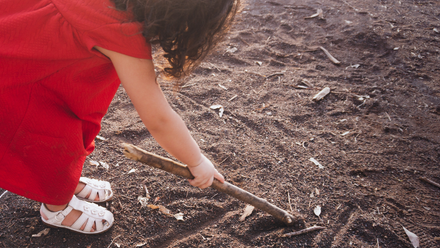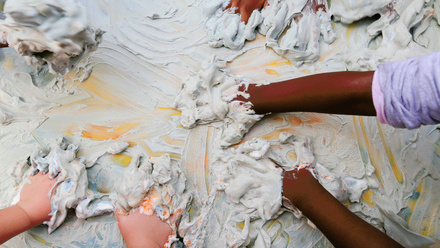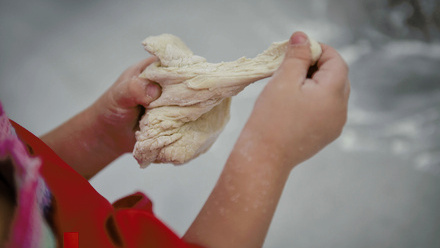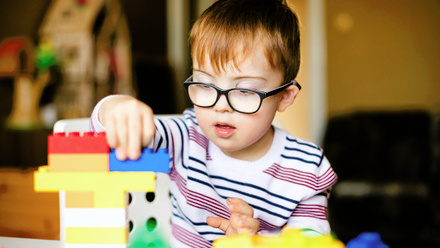How can I support play-based learning?
Play is not a luxury, but a necessity for healthy development and wellbeing. Its importance is reflected in its status as a human right. Play is an integral part of early childhood development that should be encouraged by enabling adults and enriching environments.
Play-based learning is established by many as beneficial to children in their early years. Pioneer educational theorist Friedrich Froebel (1782 - 1852) was one of many who believed this, establishing his kindergarten with the belief that play is the principle means by which children learn about the world around them and their sense of belonging within it.
Play is the highest expression of human development in childhood for it alone is the free expression of what is in a child’s soul.
Friedrich Froebel
But what exactly does play-based learning involve? And how can we, as early education and care professionals, support it? Let’s take a look!
What is play-based learning?
The definition of play-based learning lies in a definition of play, which can be tricky to define when we take into account the complexities and variety of ways that play is utilised by everyone on a daily basis. A broad definition might consider play to be “an enjoyable activity that is pursued for pleasure or its own sake” and can be solitary activities or social ones, organised or unstructured. Play comes in endless forms and is a unique experience for everyone.
Play isn’t the only way that children learn – there are other avenues to support development and specific knowledge development – but play, especially in a child’s early years, is a highly influential method for engaging children in stimulating activity, giving them the motivation and tools needed to learn about themselves in the world around them.
Play-based learning is recognised as the most valuable means for a child to learn and grow, celebrating their natural sense of curiosity and inquiry whilst providing them with the opportunities to build essential skills and knowledge for their life ahead. The power of play is recognised across England, Scotland and Wales through its policies and documentation to support professionals in this area of early education and care.
Supporting play-based learning
Create a learning environment rich in play opportunities
Provide a variety of materials that encourage exploration and creativity. Utilising different types of play that lead to different learning opportunities. Ensuring that your enabling environment is one that actively enriches playful qualities and stimulates avenues to continually explore new concepts and challenges is just the start of your play-based journey!
Child-led enquiry
Open-ended play is play where there is no structure or preset intention of the interaction and children are free to engage with resources to their own means. It refers to unstructured play experiences that encourage children to explore, create, use their imagination freely, solve problems and use those critical thinking skills.
Children are the experts when it comes to their interests and choices, especially during playful experiences. Effective observation and assessment routines allow professionals to curate playful environments that align to children’s current interests and is reflective of the community around them. In the moment planning is also a great way to take the child’s voice into greater consideration when it comes to create play-based learning experiences that are genuine and reflective of the individual child.
Encourage social interaction
Facilitate activities that require cooperation, communication, and problem-solving, such as circle-time games, collaborative projects that involve varying levels of participation, or roleplay areas scenarios.
Playful interactions are not just for learning about processes and purposes, but people too! Play promotes organic ways to navigate conflict and support children to express their feelings, listen to others and find solutions together.
Sustained shared thinking
Sustained shared thinking (SST) is about working together towards a common goal, sharing ideas to negotiate challenge and clarify individual understanding by building on concepts together. Within a play-based learning environment, this allows children to think creatively and critically about their choices, whilst interactions with adults in this way might support children to extend their thinking and develop social skills surrounding listening to others and taking on board other ideas.
Connecting play to real-life experiences
Playful experiences that reflect the background and experiences of children in the community help to establish a sense of belonging and identity within the surroundings they grow up in. Utilise the community by creating opportunities for children to play in different surroundings, such as with trips to a local woodland or park.
Using play equipment that is reflective of real and familiar interactions is another way to support a child’s understanding of their wider community through play. Use empty packaging to bring your kitchen roleplay area to life or create a posting activity for the child whose mother works at the local post office. By being able to relate their play-based learning to the wider world, children can utilise their playful experiences to process complex ideas happening all around them.
Play-based learning is an essential aspect of early childhood development and a core way to engage children in a satisfying and stimulating environment. But another valuable way to continue to promote this necessity for play-based learning is to seek out even more opportunities to learn about the power of play!
Have a look below at some of the opportunities you can take to increase your playful knowledge today.
Read The Role of Sustained Shared Thinking, Play and Metacognition in Young Children’s Learning by Iram Siraj (2015)
Watch Play-based learning in the early education classroom by Cambridge International Education (2023)
Do Review your current routine: how many opportunities are there for children to engage in playful learning? Write them down.






